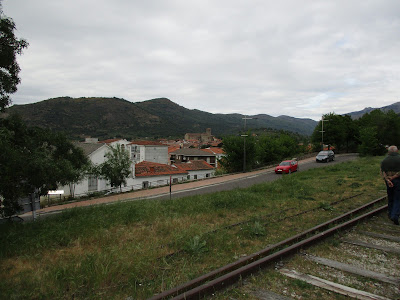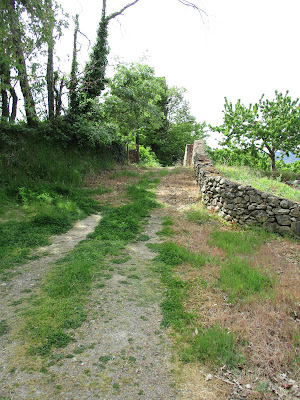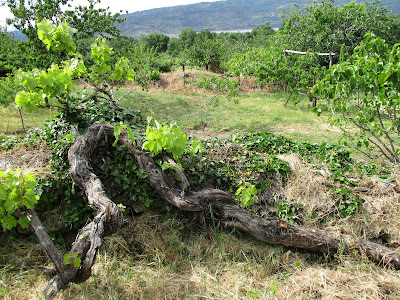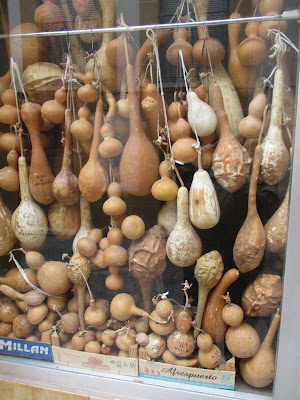Frank and I set off for a couple days to see the village of his mother, Hervas, to have a new place to visit in Spain and to get some experiential background for his book.
http://spaintravelswithpaco.blogspot.com/2017/05/franks-book.html?zx=762405123279928d
I was going to go by taxi to the bus station, but Mari thought that it was easy enough to go by Metro. So she and Frank showed me the stops.
I took line 1 at Tirso de Molina to Pacifico and then changed to line 6 (circular) in the eastward direction and got off at Mendez Alvaro (one station later)
We were to meet at the Rodillo, but I sat at the cafeteria next to it, not knowing that it was not technically the agreed upon spot. I was right in the center, and Frank and Mari found me.
The line for food was quite long. I thought the woman in front of me needed too much attention as she ordered bit after bit.
Finally, I got my coffee and pincho de tortilla. The coffee was much weaker than most expresso. Perhaps it was American style coffee.
I had ordered expresso double, but I'm unsure if I really got that. According to this article I should have.
https://travelaway.me/the-curious-case-of-coffee-in-spain/
We then went to catch the special bus to Hervas. It was to be a 4 hour ride with no bathroom breaks, although the driver said there would be one break.
I counted on it.
But the bathrooms were locked.
I was desperate.
So, I was stuck with the corner of the parking lot and some bushes.
Frank found the setting in my phone where I had by mistake turned off my mobile data and he got my phone working again. It was a long process to fix it. I am not a fan of phone technology. After that, I discovered that I had used up all my data. What a hassle.
When I go to Spain again, I'll bring a small computer and use free wifi. It is much simpler. In the end we did not get overcharged, but that was because Elizabeth called and got credits for errors. Even the phone company admitted that the whole arrangement was complicated and confusing.
On the bus, I watched an arid area give way to more trees and then more small mountainous terrain. Hervas itself has three rivers converging, and so it is lush with forest and trees.
Along the way I saw one cowboy herding in a small bunch of cows, all with horns.



We could not stay with his cousin because Cousin Paco was having the house renovated. We went to a fine, modern, inexpensive hotel and paid about 50 dollars a night for our rooms with breakfast included.
The food at this place was good.
We wound up eating there three times and having drinks with some of the cousins. For lunch, I was tempted and had flan.
We went to the cemetery and saw Frank's father's grave where also there were uncles who had died young including Jesus, who was washing up in a frigid pool to be ready to go to an event, but caught pneumonia and died.
Another was playing leap frog as a boy and his back was broken. He was put is a sort of box and restricted all his life. He met his troubles with good spirits but never recovered and died later.
These deaths illustrate how hard life was in those days and of how lucky Frank's mother Trinidad was to live through so much trouble.








We met Primo Paco and he walked us to the hotel, carrying my back pack, and then through the town.

Here was an interesting oddity

Along the way Frank pointed out places that were settings for the book.
Here was the train that she took, the station now converted into a museum with a video of what those trains were like.


This is the old station. Now a museum


We saw where roads converged, her mother would have worked her way up to the house.
We walked a long road up to where his mother and family had lived and done subsistence farming.
The land was grand. Primo Paco is reclaiming it from disuse by planting fruit trees.














Here are the new fruit trees.





Still standing are the stones that formed an animal coral. The original stone house was washed away in a storm, but the coral survived. Cousin Paco was also clearing it of shrubbery and trees.



Here is a view of the surrounding area, including a dam and lake.





Mari had an adjoining section and some difficulty with neighbors who without permission grazed horses there.
One neighbor build right next to Frank's old land and stole stones from the ancient fence to use in his building.
Primo Paco has planted trees. Cherry, other fruits. There is an old chestnut tree on the land.
The house is gone, but the area where the animals were kept is still in tact, surrounded by rocks. It was very impressive.
The view was grand, a long look at far away hills and one small lake formed by a dammed river.
People who live here still live simply. There is no electricity, but batteries are used. There is plenty of water. There were cisterns that collected water for irrigation and oddly there were small portable swimming pools that were used as swimming pools although the water at this time was not clean. I wondered if they used batteries to circulate the water.
Primo Paco has done a lot of work cleaning up the land. Once it would have included food like potatoes, but now it is all trees, some fairly recent. Paco was very proud of that tree planting and Frank was very interested in seeing all of it and knowing that the land was to be cultivated.
He knew his mother would be pleased.

At this point, there was a natural water fountain, but a warning not to drink there.


We walked along a rushing stream, the bed filled with large rocks. At these places Frank's mother would pound clothes doing laundry.
We walked up to a bullring and across from it was the chapel. We sat inside a while. There was a Virgin de Guadelupe there that was interesting.



Here is some background on this religious figure although these are not the statues in Hervas, but in another part of Extremadre.
http://mavcor.yale.edu/conversations/object-narratives/virgin-guadalupe-extremadura-
Primo Paco said that there was no long parade, but that the statue was carried around the chapel during on of the fiestas.
Fiestas happened in this area. In the courtyard around the chapel were stone benches and tables where the food would be stored.
Although Frank would see his first Madrid bull fight with me that week, he saw many fights in this bullring. As a child, he climbed the trees because he did not have a ticket.
Primo Paco remembered mixing alcohol in Coca Cola bottles to disguise it from police.
Frank was never bothered, but later the Guardia civil would chase the boys.
Along the way were a few animals
Between the land and the train station were some really fancy places, the homes of the one percent rich.
We took many local short cuts off the main roads. In one spot Primo Paco remembered that Franco brought in the Muslim soldiers and they camped there many years, in some cases fathering children.
This was not a pleasant experience.
They had a reputation for being cruel and were one more example of the oppression Franco brought to the people.
Later Frank's cousins would talk about only getting to eat the skins of the potato during the hard times. I remembered the Nazi story of the fellow at the poker table who was 9 years old when Dacau was liberated and best remembered that when the Americans came, the prisoners could then eat the whole potato rather than just the skins.
We stopped at a small pub and had a drink and rest. Primo Paco treated. I think it was here
http://cafebarpicaporte.blogspot.com/
We saw Manolo at the senior citizen club. He was with his granddaughter, a very pretty girl who spoke some English.
We went to Frank's cousin's house and others had gathered and they all caught up with stories and photos of children and grandchildren. Very friendly. Great stories. They talked all at once and rather fast. This was not the Minnesota-like reserved country folk, but chattering people.
They remarked that I did not talk much, but I could barely keep up with what I was hearing. Still, the Spanish was very clear.
Here we met Manolita, Primo Paco's wife.
And Martina.
Miquel who was once part of the Laguaria Civil and his wife Charo. The oldest in the room was Maria.
While we talked, the television played and the show was about catching huge eels somewhere in Spain.
From there some of us went to the hotel for a drink and tapa of pig entrails. I am not a fan of that. I had wine and there was more talk. Then finally it was time to say goodbye.
Frank and I then went for supper and then to bed.
Later, we ate supper on Spanish time and were up almost to midnight. I ordered off the regular menu and had Ignore cochinilla and cheese.
Too much.
When I refused bread, they offered me then a bread without gluten, but it still must have had the carbs.
Even with 8 kilometers of walking that day my blood sugar was a bit elevated. It does not take much.
I also drank cognac and I expect this is not like red wine, but elevates the sugar a bit, although I have had no consistent results.
I woke at 3 AM as is my pattern feeling pretty sore from all the walking. I had some water I bought at a grocery while walking and an Aleve to calm the aching places.
Very nice not to be forming blisters. That hiking cream is just great. I am out of it and will use a different sort of stuff that I bought in Madrid which comes in stick form like chapstick but is made to prevent blisters as well.
Since I've been home, I ordered some more cream. The stick will be great whenever the cream does not do the trick.
It has been cold and then warmer and probably will rain. I don't seem to get bothered by the cold if I wear a scarf and this new newsboy hat of mine, which is quiet warn, wonderful, and stylish.
I like it.
The hotel was a treat after my little place in Madrid. There was plenty of room. The lights work on my hotel key near the doorway. Interesting.
There was a large TV which I did not watch.
There were plenty of electrical outlets to set up phone charging, computer, and sleep apnea. The bed was quite comfortable.
The town is attractive. It is a favorite with Spanish people looking for an escape to quiet, a bit of nature, grand views, and some campo.
Along the route we stopped at some natural fountains with water coming naturally out of the rock. These were marked as untreated water and I did not drink, but Paco said they were clean and fine and that the untreated signs were hype, intended to make people pay for water. Of course, I am always wary of traveler's diarrhea.
Also, of unsuspected disease. I remember Dee's friend who in winter drank from an Adirondack stream and caught Beaver fever which almost killed her because it was unsuspected until she mentioned to the doctor her drinking from the stream.
Sometimes natural is healthy; other times nature encourages one organism to destroy another.
Anyway, I just put the cold water on my head and washed my face. It felt great.
The two occupations in the past were lumbering and textiles. Frank's family was employed by the textile company until there was a huge fire that destroyed the factory. It was never rebuilt.
Now there is much unemployment and it keeps down others coming except for those who have money or are retired and do not need work. The population was 2,000 in Frank's mother's time, and there are 3,000 now. Not much of an increase.
The cousins talked about tourists driving up the price of housing.


There were plenty of roses all around town in grand little gardens people put around there houses. One larger house had a incredible rose garden. People were out, so I could not take a photo.
Many residents included grape vines in their garden and a raw wine was produced from them. Primo Paco gave us a bottle and I drank it back in Madrid. It was not my favorite wine, but it was interesting and I enjoyed having the rare experience.
*************************************
Day 2
I slept pretty good. Three hours and then two more. I am tired but fine.
We had the buffet breakfast. I ate mostly thin slices of ham. I had a couple cups of tea and a banana. Fruit was at a minimum and carbs at a maximum.
It was a pleasant area.
We took our packed suitcases and stored them at the desk. Paying was a hassle because they charged Frank and me incorrectly, then corrected that, then tried to choose payment in dollars, but the girl had second thoughts, so we moved to Euros. I feared it would lead to double charges on my card, but it did not.
Then we went walking again.
Today's tour was of the town itself.
Here is an interesting site on Hervas and it shows many of the things we saw. It also explains the interest in the Jewish quarter. Frank took me there and explained what had happened.
http://www.piggytraveller.com/blog/jewish-legacy-extremadura-hervas/
We went to the church and took some photos. We saw Martina there with her cat and had a good visit.

This was a sundial.






It was a hard hike up the stone steps but worth it for the Panasonic view of the city. From here we could see sections we were to visit and others, like a new museum of transportation, featuring motocycles. We would skip a visit, but it was an interesting site from up high.
Next we wandered the streets. Frank showed me the boundaries of the Jewish section which was brought into array in 1492 when the Jews were tossed out of Spain. Some left and had to abandon their houses. One swapped his house for a mule and went to Portugal. Some stayed and converted, but still held their own religious ceremonies in secret.
Others migrated to other places to come back later.
It was all sad and terrible, but as Frank says, a good tourist draw.
He also showed me houses that had meaning in his family then and now. We saw where current cousins live. Primo Paco's two houses were shown. Even now the cousins live close to one another. Martina has a house that butts right up against the cathedral.
We visited the street where Frank's mother was born. Frank's book says she was born at number 5 while her grandparents lived at number 10. She remembered being born at number 12. Perhaps number 12 looks more similar to how the houses looked in olden times.


Some of the people ran small shops out of their houses.

These were the sort of water fountains that provided water to Frank's family in the old days. They were scattered around the city.We saw many of these stone fountains and other sources of water. The water here was plentiful and flowed out of many spigots to be fairly near the houses of the people.



This is the architectural syle famous in the area.


It was a great walk, with narrow streets similar to Toledo and those divided doors with the top half opening out to allow folks to sit just off the street and look out, but not have the entire house open to animals, etc.
We worked our way to the convent and had a drink there.

It was a convent and later had a hospice hospital connected to it. A wealthy friend of the family lived nearby and was inspired to enter the convent. She gave the family the land we had seen.
Along the way we passed rushing streams of cool, fresh water.

We walked by areas with shops. There were many pig related products, the pig being raised locally and processed in to ham and sausage and those fine links of chorizo I tasted decades ago when Frank brought them back to Madrid.
Primo Paco's two houses were shown.
Even now the cousins live very close. Martina has a place that butts right up against the church.
Bread was around too, including a very tempting loaf infused with chorizo so that the bread itself was an orange color. Frank bought a small one to take home to Carol.
There were other things to buy and the street market was going strong with cheeses and vegetables, a fine watermelon that Frank loves, and many clothes and other goods common to all markets. We sampled some cheese and it was very good, but I still had cheese left from the night before, so I did not buy any.
For one thing my bag was packed tightly. I had some agua mineral con gas left and cousin Paco had given us a bottle of local "raw" wine that Frank told me to take. I would drink that over the next couple days in Madrid sand it is an interesting taste, almost like a wine flavored drink with a bit of a bite. It would not be my favorite either, but it was fun to try it, knowing it was the local wine that folks made from the grapes they raised in arbors in their tiny yards. They probably had a similar wine in the youth of Frank's mother.
Frank pointed out the rich and poor sections and houses. At the realtor we saw that houses were from 50 euro to 225 euro. it was interesting what was for sale, and Frank remarked that there must be some business in buying and selling property because there were two offices.
The issue in the town is that there are no jobs. When the logging stripped the place of most of the old woods and the textiles shut down (especially after the great fire in the book) there was little to do here. To get work all of Frank's people had to migrate to Madrid, or Bilbao, or somewhere.
It still is a good bit like that.
However, when they had made a good bit of money, some people bought a place here and came back in older life at least for some part of the year.
Frank's mother was never interested in coming back, but his father would have liked it.
It was a day of threatening rain, but no rain developed, so we were lucky. The mountains were covered in a moving mist that was quite beautiful. In my hotel room, I could swing open the windows and stand and look out directly at the scenes and get grand fresh air.
We did hit rain later near Madrid, but never enough to be of any threat to comfort.
I was overly warm again even with just my windbreaker.
We walked through the area that would have been full of shops in Frank's mother's time and then later through the more modern shop area. There we heard a fellow on the guitar playing “Rock me all night long” and singing in an accented English.
We saw Paco again and had a drink just before lunch. I only ate the sausage plate. I drank nothing after breakfast. The good eating dropped my sugar numbers.
Not drinking anything prepared me for a four hour bus ride with no bathroom break. I watched the cows and rolling landscape for a while, fell asleep, woke up in Avila, and had an easy time getting to Madrid where a bathroom was waiting.
The ride back was a bit rainy, and I slept a bit.
I was tired, but it was a short Metro ride. Back in the room I ate cheese and chorizo for supper with some nice water with gas and lemon and chugs of the raw wine as well.
The trip was fairly difficult for me, but it is exactly what I need to do. I will not be up to this sort of walking when I am 80, or perhaps at any moment now, and Frank may not go back to the village again either as he has so many places to visit and see in the world.
However, these people were friendly and inclusive and full of laughter and good humor. They included me and accepted my limitation and were very nice to me and generous with time and attitude. Were they my cousins, I would be tempted to see them again soon.
I liked being in the midst of all the simultaneous talking and the chatter and laughter and kidding, even if most of the time I did not follow much of it.
No one was ever quiet, except me, and they commented on that. Odd for me to be seen as the quiet one.
The Spanish did seem to make more sense the longer I listened. I could make out the basic themes of the conversations and follow some of what people said, although sometimes I was way off base.
I don't know if I'll retain much of the Spanish. Even the few words and phrases that Frank teaches me, I soon forget.
Canela, the word for cinnamon.
Yo tango suenos - close to being sleepy
Culo Chorizeros - a bit of a nasty slang expression referring to the bottom. Hey, a bit of nasty is needed in every vocabulary.
http://www.spanishdict.com/translate/culo



No comments:
Post a Comment